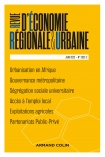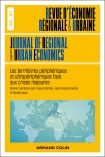
REVUE D'ÉCONOMIE RÉGIONALE ET URBAINE (2/2025)
Pour acheter ce numéro, contactez-nous
Recevez les numéros de l'année en cours et accédez à l'intégralité des articles en ligne.
Cette contribution s’intéresse aux relations entre emploi et origine migratoire en Nouvelle-Calédonie. Elle se situe dans un contexte de déficit migratoire inédit entre 2014 et 2019 conjugué à un environnement économique et institutionnel original et unique, celui de la fin de l’Accord de Nouméa. Il est concrétisé par 3 referendums questionnant l’accession à la pleine souveraineté du territoire. C’est dans ce cadre qu’un déficit migratoire inobservé depuis quatre décennies sur l’archipel conduit à interroger le poids du contexte institutionnel et politique sur les dynamiques démographiques et économiques, et d’autre part sur les situations d’emploi des personnes. Pour ce faire nous décrivons l’originalité institutionnelle dont bénéficie la Nouvelle-Calédonie depuis les accords de Matignon-Oudinot (1988) et l’instauration de politiques publiques de rééquilibrage, telles que la protection de l’emploi à la faveur des calédoniens. En mobilisant des données individuelles du recensement de la population, nos résultats montrent que les calédoniens sont moins souvent en emploi que les non-natifs quel que soit le contexte institutionnel et économique du territoire.
This contribution explores the relationship between employment and migration in New Caledonia. This insular French economy in the Pacific offers a unique institutional status. Its origins reside in a complex historical combination of identity issues and the French juridical framework. This article takes place in a context of unprecedented migration deficit between 2014 and 2019, combined with an original and unique economic and above all institutional environment, that of the end of the Nouméa Accord. This has resulted in 3 referendums questioning the territory’s accession to full sovereignty. It is in this context that a migration deficit unobserved for four decades in the archipelago leads us to question the weight of the institutional and political context on demographic and economic dynamics, and on the employment situation of individuals. To do this, we describe the institutional originality enjoyed by New Caledonia since the Matignon-Oudinot agreements (1988) and the introduction of rebalancing public policies, such as job protection for New Caledonians. Then, using individual data from the population census, our results show that employment among New Caledonians remains less significant than for non-natives, regardless of the territory’s institutional and economic context. In addition to providing a contribution to research into the relationship between access to employment and the origin of individuals, this article highlights the ongoing necessity of policies to reduce inequalities. In a context of high political tension, high living costs and institutional uncertainty, it seems essential that investment in training local young people and in access to employment produce noticeable benefits.

